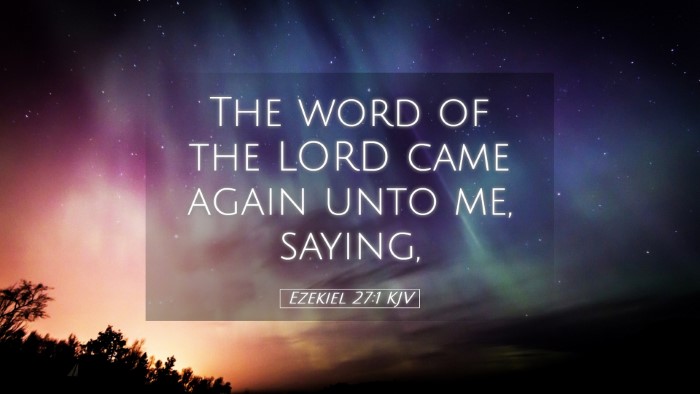Ezekiel 27:1 Commentary
Bible Verse: "The word of the LORD came again unto me, saying," (Ezekiel 27:1, KJV)
Introduction
Ezekiel 27 marks a crucial point in the prophetic messages of Ezekiel, as it transitions from the previous declarations of judgment against Jerusalem to a lamentation over Tyre, a significant and prosperous city of the ancient world. The chapter illustrates the fall of Tyre, a metaphor for pride and materialism that often leads to God's judgment.
Context and Background
The context of Ezekiel 27 lies within a broader prophetic narrative where God uses the symbol of Tyre to highlight the dangers of commercialism, pride, and the illusion of security based on worldly goods. Scholars like Matthew Henry emphasize that Tyre represents not just a physical location but a spiritual condition that leads nations and individuals away from reliance on God.
-
Significance of Tyre: Tyre was a major trading hub known for its wealth and maritime prowess. The city symbolized the peak of economic strength and human ingenuity, hence making its downfall a powerful statement of divine justice.
-
Prophetic Setting: Ezekiel's prophecies often addressed both the immediate and distant future. The economic implications of Tyre’s destruction serve as a warning to all nations about the fleeting nature of material wealth.
Theological Insights
In this chapter, God's word coming again to Ezekiel underscores the importance of listening to divine revelation amidst the clamor of worldly affairs. Both Albert Barnes and Adam Clarke point out that this phrase signals a renewed emphasis on Ezekiel’s message and its relevance to Israel and the surrounding nations.
-
Divine Communication: The phrase "the word of the LORD came again unto me" asserts the ongoing relationship between God and His prophet, reminding believers of the continuity of God’s guidance amid crises.
-
Judgment and Mercy: God’s pronouncement, as reflected in this verse, is one of judgment; however, it also opens the door for understanding mercy as Tyre’s downfall may lead others to repentance.
Exegesis of Ezekiel 27:1
Ezekiel 27:1 serves as an introductory verse to what is often referred to as the "lamentation for Tyre."
Matthew Henry highlights how the verse establishes the serious tone of the subsequent chapter, suggesting a shift from mere announcements of judgment to a mournful reflection on lost glory.
The lament is structured to encompass various aspects of Tyre's grandeur, ultimately serving to illustrate the futility of relying on human achievements without acknowledging God’s sovereignty.
Lessons for Today
The warnings embedded in Ezekiel 27:1 remain profoundly applicable for contemporary audiences, particularly within the church. Albert Barnes remarks that this passage encourages introspection regarding our values and allegiances—whether we are placing our trust in transient wealth or in the eternal nature of God.
-
The Illusion of Security: Modern society, much like ancient Tyre, often equates success with material prosperity. This passage serves as a reminder that true security is found in faithfulness to God.
-
The Call for Repentance: Just as Tyre’s luxury led to complacency, today’s believers are called to check their hearts against the allure of the world, ensuring that their primary identity is rooted in Christ rather than in possessions or status.
Conclusion
In summary, Ezekiel 27:1 opens a significant chapter in prophetic literature, urging readers to recognize the implications of Tyre's fall. It serves as a poignant reminder of the transient nature of wealth, the importance of listening to divine revelation, and the necessity of rooting one's identity in Christ rather than in worldly achievements. As we reflect on this passage, may it inspire a commitment to divine priorities in all areas of life.


